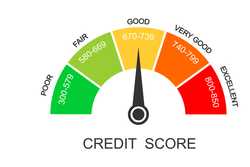What Credit Score is Needed to Buy a Car?

Our evaluations and opinions are not influenced by our advertising relationships, but we may earn a commission from our partners’ links. This content is created by TIME Stamped, under TIME’s direction and produced in accordance with TIME’s editorial guidelines and overseen by TIME’s editorial staff. Learn more about it.
Buying a car is a unique experience. Many buyers find a mix of excitement over their new purchase alongside stress over spending so much at once. If you don’t have enough cash to buy the vehicle outright, you may want to know what credit score is needed to buy a car with a loan. Here’s a closer look at the score needed to buy a car and how to track that score as you work to get the best rates and approval odds.
The most common credit score lenders use is the FICO score, an acronym for Fair Isaac Corporation, responsible for the popular credit scoring model. While lenders often look at other factors as well, credit scores are central to the approval process.
FICO created a specific scoring model for car loans called the FICO Auto score. The FICO Auto score uses a slightly different formula and range of credit scores. Still, it is generally similar to the best-known FICO credit score, where on-time payments and good management of your credit lead to better scores.
FICO isn’t the only credit score, however. You may also see the VantageScore used in auto lending. VantageScore is the main alternative to FICO. Like its competitors, credit balances and payment history play the biggest role in determining your score.
Credit scores factor into two major parts of your auto loan. With most lenders, it’s used both for loan approval and determining your interest rate.
For approval, many lenders set a minimum credit score for new loans. You may not be approved for a loan if you don’t meet minimum credit requirements. However, lenders sometimes use several criteria, including your debt-to-income ratio and other signals from your credit report, to determine if you’re approved.
Once approved, credit scores play a role in determining interest rates. Borrowers with the best credit scores often qualify for the lowest possible interest rates, while borrowers with lower credit scores pay higher rates. Interest rates correlate to the perceived risk that the borrower won’t repay the loan as agreed. High credit scores indicate a lower risk of missed payments, while low scores indicate a higher risk of late payments, missed payments, and default.
Every lender uses its own proprietary criteria when approving auto loans. Few banks, credit unions, and online lenders use the exact same model, so it’s possible to be approved by one lender and denied by another.
The primary credit score models used for auto lending include:
Remember that your credit score may be different when comparing FICO and VantageScore. Also, three consumer credit bureaus store credit histories, and scores may vary depending on whether the lender uses Experian, TransUnion, or Equifax.
Experian offers an excellent free consumer website for monitoring your credit.
For more detailed analysis across all credit scoring models and bureaus, a paid subscription to a service like MyFICO can meet your needs.
According to Experian, the following credit score categories are used by lenders when analyzing consumer credit scores:
| Credit score | Borrower credit rating |
|---|---|
800 to 850 | Exceptional |
740 to 799 | Very good |
670 to 739 | Good |
580 to 669 | Fair |
300 to 579 | Poor |
If your credit score isn’t as good as you’d like, you can take steps to improve it. Some take months or years to see an impact, while others can raise your score quickly. Paying off credit card balances is one of the fastest ways to improve your credit while making 100% on-time payments helps build an excellent credit score over time.
You can also look to credit-building tools like Experian Boost. After signing up for a free Experian account, you can link your bank accounts and add certain billers, such as your mobile phone bill or utilities. Some companies offer paid services to add your monthly rent to your credit report, which flows through to your credit score.
If you have bad credit, you may still have options to get a car. Consider these strategies to get a new set of wheels:
To apply for an auto loan, follow these general steps:
Before walking into a dealership, get a snapshot of your credit score. Your credit card issuer or bank may offer free credit score checks. As mentioned above, services like MyFICO provide detailed information for a fee.
Know what you can afford. Look at your monthly income, debts, and other financial obligations to gauge how much you can responsibly allocate for car payments. This will help you avoid falling in love with a car you can't afford. Remember that a larger down payment can significantly reduce your monthly payments.
Banks, credit unions, and online lenders often offer pre-approval processes that give you an idea of the loan amount and interest rate you qualify for. This way, you'll have a solid benchmark when you enter negotiations with the dealer. Look for pre-approvals that don’t impact your credit score until you’re ready to proceed with a specific offer.
Once you have pre-approval, it's time to compare the details. Don't just look at the monthly payments—examine the loan terms, annual percentage rate (APR), and any additional fees. Sometimes, a lower monthly payment means a longer loan term, which could cost you more in the long run.
Now, it's time to finalize the deal. You'll need to provide some documentation, such as proof of income, identity, and other personal information. Read the fine print, ask questions about loan terms, and be fully aware of all loan details before you sign.
Better credit helps your finances in many ways, but millions of people don’t have good credit and still find a way to buy a car. While you should always work to improve your credit profile, saving up a larger down payment, buying a cheaper car, or finding a flexible lender can put you on track to get on the road with a safe and reliable vehicle.
Using the traditional FICO model, an excellent score is 800 and higher. Good FICO Auto scores start at around 700, but every lender uses different criteria, so don’t necessarily fixate on a specific score.
Most lenders will lend to borrowers with a 700 credit score, assuming they meet other qualifying criteria, such as a suitable debt-to-income ratio.
Many lenders will work with a borrower with a 600 credit score, though you may pay higher interest rates or have to make up for your credit score with a larger down payment or strong debt-to-income ratio.
With a credit score of 625, you may struggle to be approved for an auto loan, and you likely won’t qualify for the best rates. However, a 625 credit score is considered “fair” and probably won’t disqualify you from finding a suitable auto loan.
The information presented here is created by TIME Stamped and overseen by TIME editorial staff. To learn more, see our About Us page.





